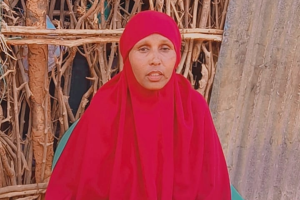
Sowda is from a village in Mandera County, Kenya. At around 14 years old (she is not sure of her age), she underwent female genital mutilation (FGM)* in what she felt was a way for others to control her as well as prepare her for marriage.
I am happy to be alive today because I remember that day, I bled profusely and at some point[s] I even lost consciousness.
After going through FGM, and still a child, Sowda was then married to an older man. Reflecting on that time in her life, she says:
As a young child I suffered in my marriage, the man I was married to, used to beat me, I was not able to have children and I did not know my responsibilities as a wife. I tried to run away but I was not able to as my parents kept sending me back saying that they could not defy the culture.
When her husband died, Sowda was able to remarry a man she loved and they have since had three children together.
Sowda is now involved in a project, we support, helping local communities and activists gain information and share knowledge about female genital mutilation and sexual and gender based violence (SGBV). The project creates spaces for Sowda and her community to express their fears and reservations about female genital mutilation. It also creates a space for men to learn more about these issues, which Sowda explains has given her a voice to speak publicly and make decisions about her health.
Sowda is keen to get more women involved in the project and to see that their voices are heard on these matters.
…I suffered because no one could speak up for me back then, but now I will work with my husband and my community to change this so that no girl should suffer like me.
*Please note: We understand that the use of “Female Genital Mutilation” is a contested term. We use it, in this instance, as it is the term used by Sowda and the health workers and activists we work with in this context. Read our definition here.

